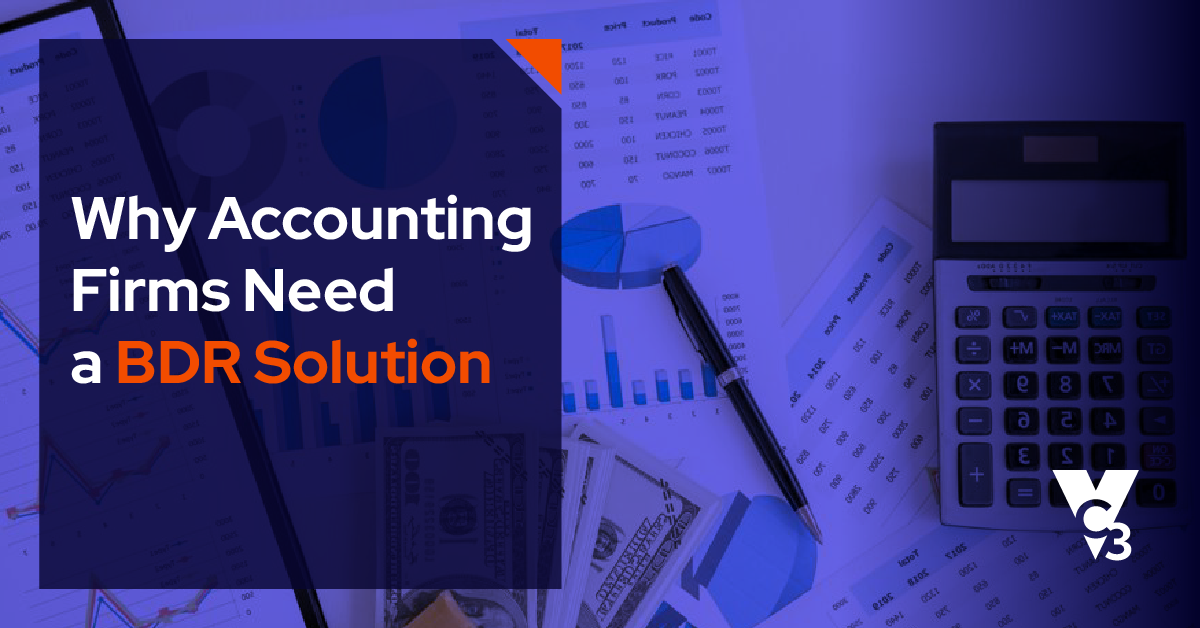As a certified public accountant (CPA), you’re entrusted to protect the sensitive and valuable information of your clients. You can implement an intrusion detection system (IDS), use a firewall, and anti-malware and antivirus software — all of which steps are highly recommended as part of a layered approach to cybersecurity. However, you also need to establish a backup & disaster recovery (BDR) solution for your business as well.
Place yourself in the shoes of one of our clients: VC3, in combination with their backup & disaster recovery (BDR) solution, came to the rescue of their business when their server crashed one night after hours. All of their information was wiped out as a result of the hardware failure. Thankfully, we’d already made a complete image of their 200GB information store of their Exchange Server and were able to get it back up and running on the BDR server the next day.
Data backup and a disaster recovery plan fit together like peanut butter and jelly. The data backup copies or replicates your data from one device to another, whereas a DR plan is that process on steroids — it’s about getting your business back to running at 100% after being knocked back to square one from a cyber attack or another disaster. This means that a reliable BDR plan helps to save businesses from:
- Unplanned business interruptions
- Loss of productivity
- Reduced cash flow
Ask yourself: If this happened to your accounting firm, would you be prepared? Do you have a BDR solution in place to protect your accounting technology? If you don’t, I’ve put together a list of the reasons why accounting firms need to get an effective BDR solution in place now.
BDR IS A CRITICAL PART OF YOUR BUSINESS CONTINUITY PLAN
Some small and medium-sized business (SMBs) leaders are too focused on what is happening now with their business, meaning that they may not consider ways to prevent what could happen to their business in the future. For others, they may think that an investment in one of these solutions is too costly, not considering the cost of not investing in this kind of insurance — losing all of their data that could have otherwise been saved.
This is particularly disturbing considering that surveys show that 40% of organizations don’t have any kind of documented disaster recovery plan in place — and another 40% of companies that do have a plan in place only bother to test it once a year.
Unfortunately, these decisions demonstrate how easy it can be for busy organizations to allow the task of creating a business continuity plan (BCP) to simply fall by the wayside until it’s too late. Thankfully, you have FPA IT security services experts on your side to ensure that doesn’t happen to your business. We’re here to ensure that our clients are properly informed about all of the options, costs, and risks associated with implementing a BCP and will help you develop one.
BDR HELPS TO GET YOUR BUSINESS UP & RUNNING AFTER AN INEVITABLE ATTACK
As an experienced IT professional, the cavalier attitude demonstrated by these companies’ leaders toward implementing a backup & disaster recovery solution alarms me. The reason is because I know that it’s virtually impossible to prevent 100% of all cyber attacks. And, if you’re not regularly updating your DR plan and performing semi-annual failover testing to ensure your data backups are operational, then your efforts will be meaningless.
A comprehensive BDR solution helps businesses minimize any potential downtime that results from any natural or manmade disaster. This means that your business will be able to restore downed servers in as little as an hour, depending on the size of your backups.
BOTTOM LINE
Protecting your data is your top priority as a trusted CPA. A critical step in doing so is choosing the right backup and storage method and provider that will meet the needs of your accounting firm. This would be a solution that not only helps to keep your firm from permanently losing data but also helps to get your accounting firm back online as quickly as possible.





